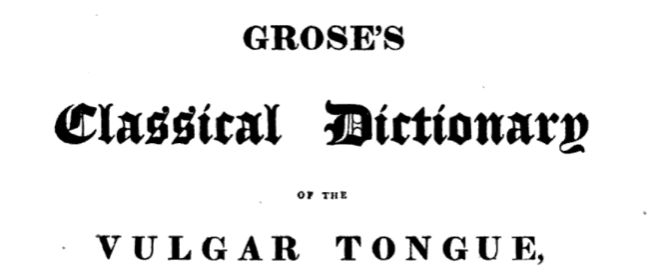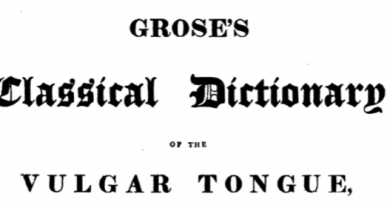Dictionary of the Vulgar Tongue – Day Sixty-Eight
The Dictionary of the Vulgar Tongue was first published at the end of the eighteenth century, and given that the Coronavirus crisis is giving too much time to read books, I thought I’d pick a daily word from it until I got bored…..
Chalkers
Many words used in this dictionary seem to have been used sparsely and although they might be interesting for their formation, they weren’t really part of the vernacular. This definition was though used widely in Ireland and I suspect that you could easily make a whole book out of it. The dictionary says:
“Men of wit, in Ireland, who in the night amuse themselves with cutting inoffensive passengers across the face with a knife. They are somewhat like those facetious gentlemen some time ago known in England by the title of Sweaters and Mohocks”.
Going back to front, the Mohocks story scared a lot of people in eighteenth-century Britain. There were stories that it was a group of young men who killed and maimed men and raped women, all just for fun as they never stole anything. John Gay wrote his first drama about them, but he also noted that most of the stories had been made up on Grub Street, a street in London known for journalists who wanted to sell newspapers by exaggeration, fraud and shock. Little has perhaps changed.
The story of the Sweaters is similar, they were meant to be gangs of young men who would physically attack men in a horrific manner, leaving them to sometimes die of their injuries. In reality, actual facts about this happening are much harder to come by.
So, over to Ireland and the Chalkers. There is much more evidence for gangs causing physical harm and Parliament got engaged with this topic. A Parliamentary Act from 1796 reads:
“Evil dispossessed people have of late with knives or other offensive weapons, cut and stabbed, or with pistols have wounded, or attempted to wound, by firing, shooting and discharging the same, many of his Majesty’s subjects either with an intent to murder, rob or maim, or merely with a wicked intent to disable or disfigure them; and whereas the laws now in force to prevent wanton, wilful and malicious maiming and wounding, are found not to be sufficiently effectual to deter such evil dispossessed people”.
The decision was then that anyone involved in these actions would be sentenced to death and their bodies sent to anatomists for dissection.
Random attacks on civilians weren’t that common though, it was mainly directed at soldiers and had been caused by arguments in how the Irish Army had been managed during the late eighteenth century. Rewards were offered for soldiers who were maimed, which is why criminals moved into this arena of attack, it was still for a financial gain but just not one which directly took from the soldier.
But, all of this caused fear in the population and these gangs lived on in the collective memory for some decades, ready to terrify the next generation.


